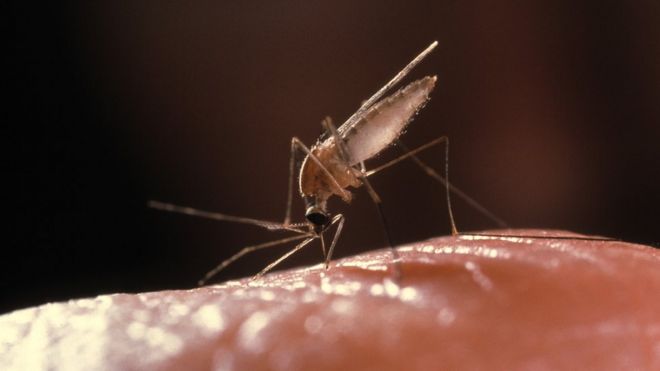Malaria drugs fail for first time on patients in UK

The patients had caught malaria when visiting Africa

By James Gallagher-31 January 2017
A key malaria treatment has failed for the first time in patients being treated in the UK, doctors say.
The drug combination was unable to cure four patients, who had all visited Africa, in early signs the parasite is evolving resistance.
A team at the London School of Hygiene and Tropical Medicine said it was too early to panic.
But it warned things could suddenly get worse and demanded an urgent appraisal of drug-resistance levels in Africa.
Malaria parasites are spread by bites from infected mosquitoes.
It is a major killer of the under-fives with one child dying from the disease every two minutes.
Between 1,500 and 2,000 people are treated for malaria in the UK each year - always after foreign travel.
Most are treated with the combination drug: artemether-lumefantrine.
But clinical reports, now detailed in the journal Antimicrobial Agents and Chemotherapy, showed the therapy failed in four patients between October 2015 and February 2016.
All initially responded to therapy and were sent home, but were readmitted around a month later when the infection rebounded.
Samples of the parasite that causes malaria were analysed at the Malaria Reference Laboratory at the London School of Hygiene and Tropical Medicine.
Dr Colin Sutherland told the BBC News website: "It's remarkable there's been four apparent failures of treatment, there's not been any other published account [in the UK]."
All of the patients were eventually treated using other therapies.
But the detailed analysis of the parasites suggested they were developing ways of resisting the effects of the front-line drugs.
'Clinically challenging'
Dr Sutherland added: "It does feel like something is changing, but we're not yet in a crisis.
"It is an early sign and we need to take it quite seriously as it may be snowballing into something with greater impact."
Two of the cases were associated with travel to Uganda, one with Angola and one with Liberia - suggesting drug-resistant malaria could be emerging over wide regions of the continent.
Dr Sutherland added: "There has been anecdotal evidence in Africa of treatment failure on a scale that is clinically challenging.
"We need to go in and look carefully at drug efficacy."
The malaria parasites all seemed to be evolving different mechanisms rather than there being one new type of resistant malaria parasite spreading through the continent.
The type of resistance is also clearly distinct from the form developing in South East Asia that has been causing huge international concern.
Dr Sutherland says doctors in the UK need to be aware the drugs might not work and argued current treatment guidelines may need to be reviewed.
Prof David Lalloo, Dean of Clinical Sciences and International Public Health at Liverpool School of Tropical Medicine, said more studies are needed.
"This is an interesting and well conducted study and again emphasises the incredible ability of the malaria parasite to rapidly evolve to become resistant to antimalarial treatment," he said.
"It is too early to fully evaluate the significance of these findings but the paper highlights the need to be constantly vigilant when treating patients with malaria and larger studies are certainly needed to explore this issue further."
Prof Dame Sally Davies, the chief medical officer for England, said: "This is a stark warning for the future of global medicine.
"We are in dire need of new drugs to keep pace with resistance, in low and middle-income countries in particular, the consequences of ineffective drugs are catastrophic."
Follow James on Twitter.
